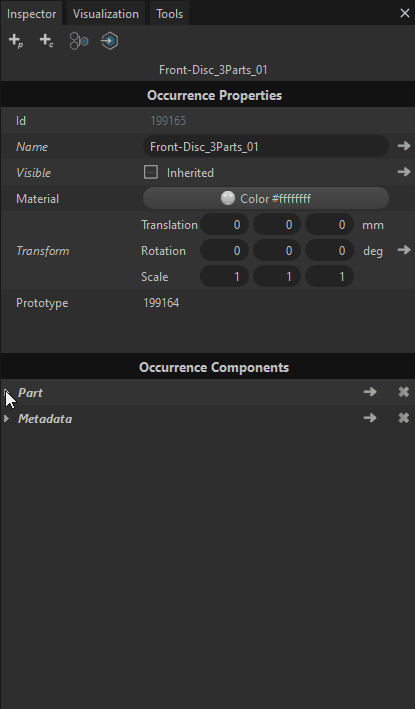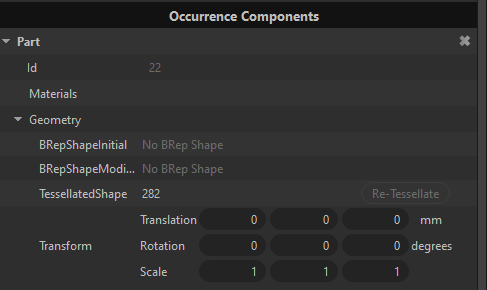Occurrence Components

An occurrence can receive components to modulate its behavior (just like in Unity3D).
An occurrence is by default an empty node, that does not contain any geometry. It does not accomplish much by itself, but it acts as a container for components, which implement the real functionality.
Accessing components
A selected occurrence' components can be visualized in the Inspector panel, in a dedicated widget called Occurrence Components (below the Occurrence Properties widget).
This widget lists one foldable row per component (Part row, Light row, etc).
INFO Component can be manipulated throught the scripting API using functions like getComponent, hasComponent, listComponents... More information here
Component types
There are multiple component types in Pixyz, and an occurrence can own a maximum of one of each component type.
|
Component type |
Description |
|
A Part component contains geometry information (CAD, mesh, lines, UVs...).
To retrieve mesh definitions from a list of occurrences using the Python API, see here |
|
|
PMI |
An occurrence can have a PMI component, allowing to display PMI information. PMI can be displayed from the Variants panel, where all scene PMI and views are listed. See also Variants and PMI |
|
An occurrence with a Light component stores a light object, which can be used to modify the lighting of the scene. Available light objects are: Directional light, Point light and Spot light |
|
|
Visual Behavior |
An occurrence with a Visual Behavior component has a specific behavior in the Pixyz viewer, meant to be used in VR mode with Pixyz Review. |
|
Interaction Behavior |
An occurrence with an Interaction Behavior component has a specific behavior in Pixyz viewer, meant to be used in VR mode with Pixyz Review. |
|
An occurrence can have a Metadata component, that stores Metadata information, which is a list of basic key/value pairs, called metadata properties, retrieved when importing a file.
You can add/modify/delete metadata though the API: see here |
|
|
Variant |
An occurrence can have a Variant component, which links the occurrence to the variants that use this occurrence. See also Variants and PMI |
|
Animation |
An occurrence can have an Animation component, that stores the position information in time of this occurrence for a given animation clip. See also About Animation |
|
Joint |
An occurrence can have a Joint component, that links animation attributes stored in a mesh with a Joint from a skeleton. See also About Animation |

